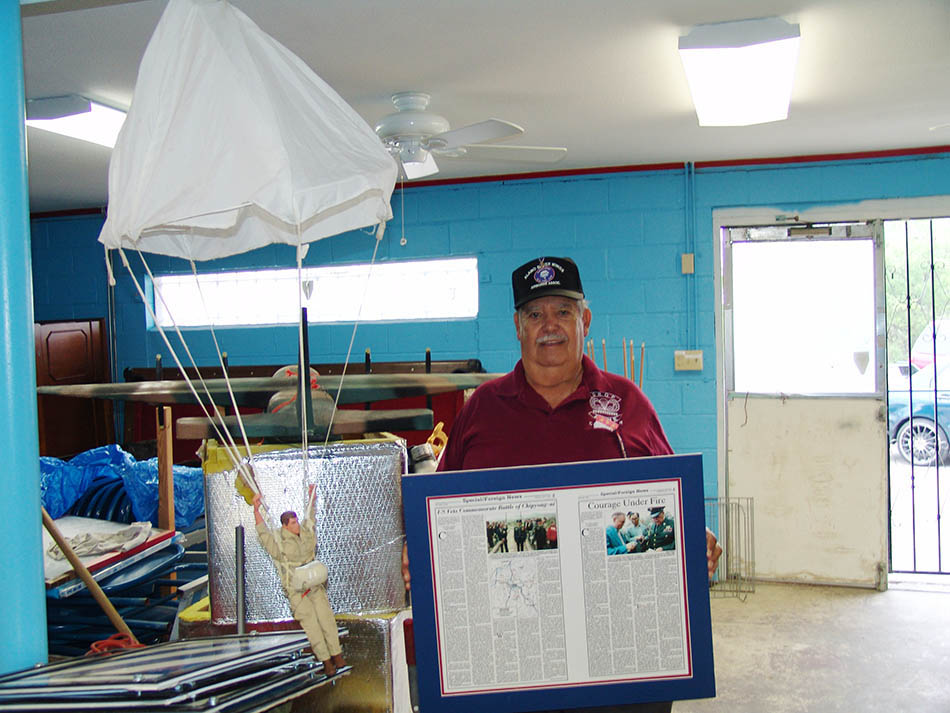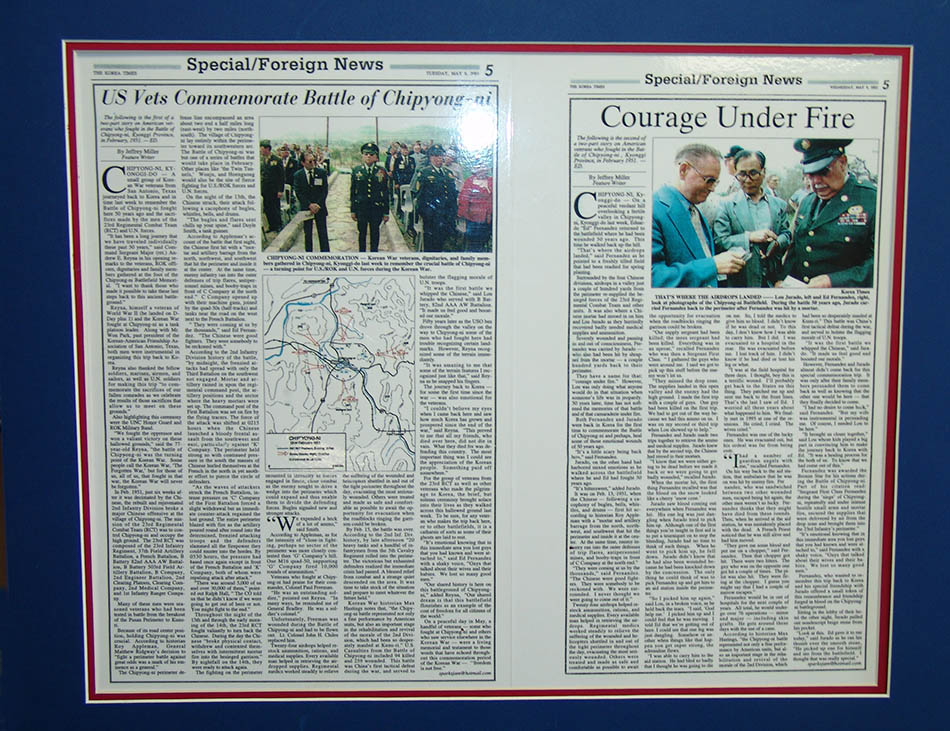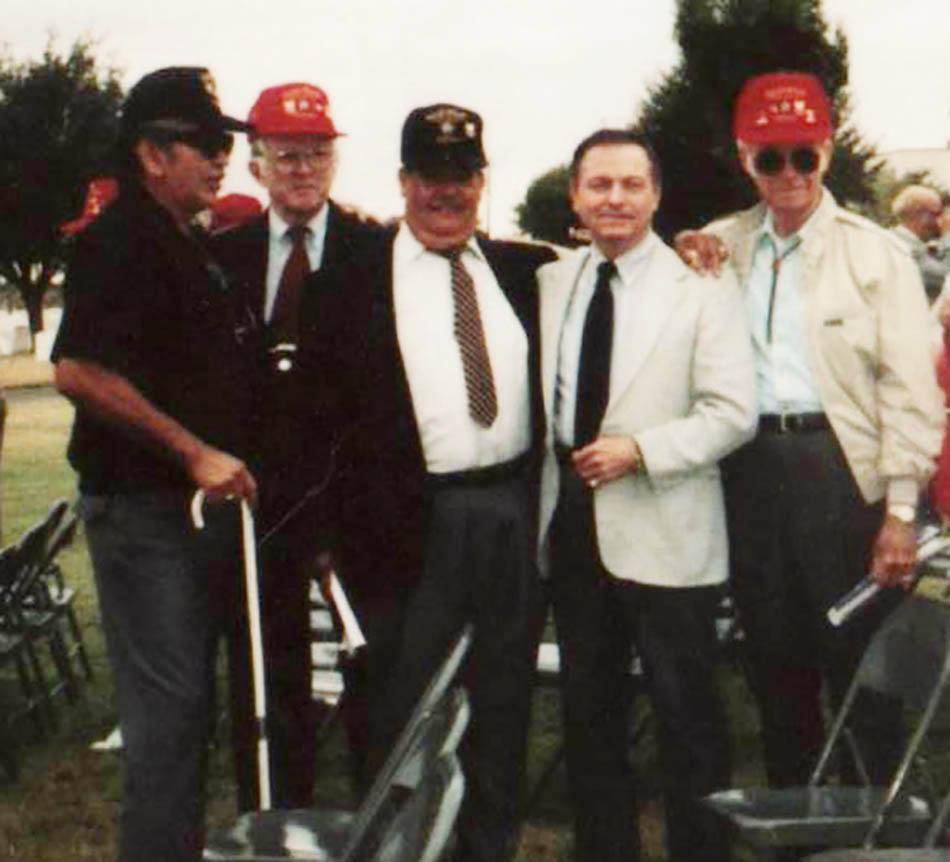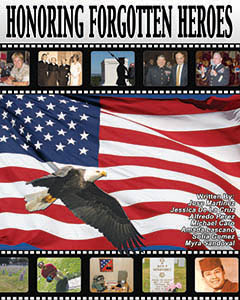
COMMAND MASTER SERGEANT EDUARDO AL FERNANDEZ
U.S. ARMY
Born in Sonora, Mexico in 1929, Eduardo Al Fernandez made a name for himself, despite all of his incredibly overwhelming obstacles. With luck on his side and the help of those whom respected him, Fernandez overcame and thrived at any challenge thrown at him.
His mother died when he was only three years old, leaving his father to care for him and his siblings. “My father had to work all day in the agriculture fields doing farming and didn’t have time to take care of my brother and two sisters,” said Fernandez. Because of the difficult situation his family was in, Fernandez’s aunt and her husband adopted him and his siblings and they moved to a border-mining town in Douglas, Arizona. “I am grateful to them for what they did for us. They were the only parents we knew,” said Fernandez.
Moving there gave him more opportunities, but still, he grew up in a time when expectations for Mexicans weren’t very high. “Graduating from High School back then was not always an option. We had to eat and survive,” said Fernandez. So when he was 15, he went to Los Angeles in search of a career opportunity and found himself picking cherries.
The year was 1946 and World War II had just ended. Fernandez’s fate soon changed while out shopping one day. “An Army Recruiter came up to me and told me he had plenty of work,” said Fernandez. He wasn’t old enough to go because of his age, but he didn’t let that stop him. “He asked my age, and I was only 16 years-old. I asked him how old I need to be and he said 17, well I am 17, where do I sign,” said a reminiscent Fernandez.
So Fernandez began a new life of combat and discipline at the young age of 17.
But one of his greater goals was to continue with the education he missed out on. He received his G.E.D. near the end of his enlistment. After that, he had plans to attend Texas Western College in El Paso, Texas, but “the Truman Extension was initiated, this meant I had to stay for the duration of the war,’ said Fernandez.
By 1950, he was an E-6 Sergeant First Class. In just a few years, the barely legal 21-year-old had climbed the ranks of army officials and was now the one with authority.
The Korean War broke out in June of 1950 and Fernandez and his men were there to see it through. “I was part of the first division to land in Korea from the U.S. Army. We arrived on August 3, 1950 in the city of Puson. The briefing we got was that we were only going to be there for a few weeks. We ended up staying there for more than six months and traveled from the peninsula of Pusan to the Yalu River, which is on the Chinese border,” said Fernandez.
“I remember it was around November and President McArthur said we would be home for Thanksgiving. After that, things changed dramatically and we began to get attacked by the Chinese Army. We would retreat and fight, retreat and fight. We were getting ambushed and lost a lot of our ammunition and equipment. I was very lucky not to get captured or killed,” said Fernandez.
His luck would continue to protect him in his path through combat. As they retreated from the Chinese attack, the group was told to separate. “Some were told to take the right flank, and others the left flank.” Fernandez and 30 to 40 men were told to continue right when they got to a fork in the road, but decided to go left instead. “Most of the units that took the right road, about ninety men, were ambushed; many killed and a lot of them were captured and died in captivity. Many were in very bad shape and died after their release. We were saved by the grace of God,” said Fernandez.
“It was now January 1951 and the decisive Battle of Chipyong-ni was to be fought on the 13th, 14th and 15th of February, where I first became wounded. The battle lasted three days and we were surrounded and low on ammunition and medical supplies, but we held the enemy and the Chinese eventually retreated for the first time,” said Fernandez.

It was in this battle that his luck almost did run out. His meeting with Lou Jurado on that fateful night would save and change his perspective on life forever.
“Lou belonged to a different Unit and came over to our tent to give us a bottle of Whiskey. He said he didn’t drink, so he wanted us to enjoy the Whiskey. He knew we were all cold,” said Fernandez, remembering it like it was yesterday. Before Jurado could leave, Fernandez insisted he accompany him to the Drop Zone to get more ammunition. Reluctantly, Jurado agreed. “I asked Jurado to come with me, and he said it was very dangerous, to go right now. I told him that he had no option, we needed the supplies,” explained Fernandez.
The Drop Zone is an open space where food and ammunition is dropped off to supply and refuel those in combat. Unfortunately, because it is an open space, the enemy can also attack. It is anyone’s guess when and if the enemy will attack a soldier, when down there.
Fernandez felt confident, though cautious about the move towards the Drop Zone, saying, “I had already been there three times before, but we would have to weave our way down there because one man had already been killed.”
When they arrived, they both began loading up on ammunition before the enemy spotted them. “I was carrying a 50 Caliber box of ammo and some grenades, when I was struck,” said Fernandez. “I was wounded three times all together, really bad. If it would have been a direct hit, I would not be here. I was bleeding a lot and my leg was in bad shape. My stomach had shrapnel wounds as well.”
Jurado, through sheer panic and adrenaline, was able to drag the much bigger and wounded Fernandez a quarter of a mile out of the Drop Zone. “Jurado looked at me and said he was not sure how he could carry me. He kept telling me to hang in there. I was bleeding profusely and he kept dragging me back up the hill.” It was at the top of the hill that the medics came and began working on Fernandez. Jurado later realized he had also been hit, though not severely. Even then, his focus was not on himself. “He was not concerned with his injuries. I was passing out but I could hear him say ‘don’t worry about me.’ This man saved my life! If Lou Jurado would not have gotten me up that hill, I would have died there. I owe him a lot,” said an almost emotional Fernandez.

Fernandez’s fate would be tested once more in an attempt to get help. “We left by a vehicle marked as an ambulance, which was not suppose to be attacked and sure enough I remember the guy above me was hit. I was below him and the blood was dripping down,” remembers Fernandez. Even while being transferred by plane, their life was in danger. “They put us in a MediVac helicopter, clearly marked as a medical transport vehicle and we were shot at again! The guy on the other side of me was killed. By the Grace of God, I am one lucky man,” said a grateful Fernandez.
After that fateful meeting, Fernandez lost complete contact with Jurado. It was as if he was placed there in that moment to watch over and save Fernandez.
He was transferred from Korea to Japan, to Hawaii and finally to Texas for medical treatment. He remained there for four years, receiving medication and therapy. It was a long recovery for Fernandez, he had 76 minor and major surgeries; few on his stomach but most of them on his leg.
After his recovery, Fernandez was advised by a family friend to remain in the forces so he could receive his benefits and retirement. “They assigned me non-combat operations, so I re-enlisted for the long haul,” said Fernandez.
Though he was no longer on the front line, Fernandez didn’t stop being active in the Army. In 1955, he had orders to go to France, where he lived for five years with his wife and daughter Guadalupe. He also lived for a period in Germany as Sergeant Major, where he continued taking various assignments. In 1973 he retired and began taking time to focus on his own life and family.
In 1987, his wife passed away, and a few years later in 1991, he remarried a woman he met through friends. Her name is Hope and they are still happy and together today.
Although Fernandez continued forward with his life, he always wanted to contact Lou Jurado once more to give him the thanks he deserved. The story of his own rescue inspired him to open up a bar dedicated to all those fallen soldiers who weren’t lucky enough to meet a “Lou Jurado.”

It wasn’t until 1996 that the two met up again, where Fernandez could finally thank the person that saved his life. The two men formed a bond that began more than 30 years before, even though they had lost complete contact with each other. When they met again, they became good friends and have remained that way to this day. “The first thing that comes to my mind from the Korean War is the man that saved my life, his name is Lou Jurado,” said Fernandez.
“My dream was to open a restaurant/bar someday, so in 1994 “Drop Zone” was born,” said Fernandez. When he opened the restaurant, Fernandez didn’t want it to be a government-created American Legion. He just wanted to create an atmosphere where war veterans could go and hang out and have a beer. He wanted to create a sanctuary for all those who didn’t feel comfortable anywhere else. “I was lucky to have come home and many others were not, that is why I did this,” said Fernandez.
However, the future of the restaurant has been uncertain. In 1999, after the bar became financially stressful, the Fernandez family was forced to sell the “Drop Zone,” but in October of 2005, they were able to regain its ownership and open it once more.
In 2004, he went to South Korea to be a part of a ceremony that honored the Korean War Veterans for their time spent there. “A lot of children approached us and said thank you for what we did. That was beautiful,” said Fernandez.
Today, Fernandez belongs to the VFW American Legion and remains in contact with his “military family.” “Right now I am 79 years old and my wife Hope is 70 years old. We love and support each other. She sometimes calls me her hero, because I risked my life to save other people’s lives.”
“I served a total of 26 years in the Army and I retired as a Command Master Sergeant E-9, the highest grade possible,” said a proud Fernandez.
Eduardo Fernandez came from humble beginnings; the son of a farmer father and a deceased mother. Despite this, his courage and determination to succeed rewarded him with life-long recognition because of the lives he saved and the chances he took. With the help of an angel named Lou Jurado, his time here was extended so that his influence could continue with the next generation of leaders.
— Story by: Jessica De La Cruz - Interview by: Alfredo Perez
|
|



CLICK HERE FOR TABLE OF CONTENTS

|
